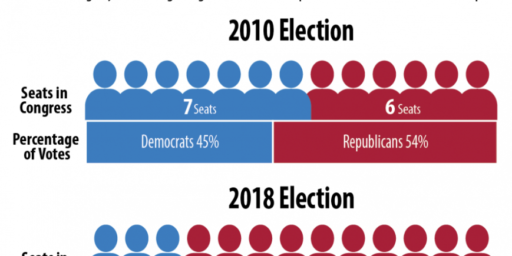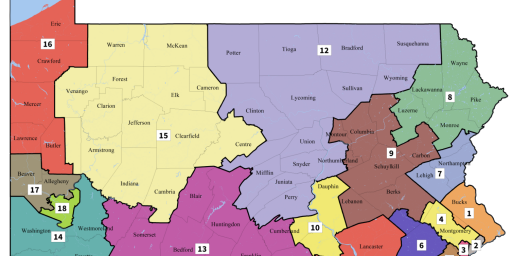New York’s Gerrymandering Disarmament
When doing the right thing is the wrong thing.

Last week, the opinion editor of the New York Daily News reached out to ask if I’d be interested in writing something about his state’s recent court decision overturning an electoral map heavily gerrymandered to favor Democrats in light of my December OTB post on the Democrats’ unilateral disarmament on gerrymandering. It was published this morning.
“Democrats’ dangerous gerrymandering disarmament: New York is the latest state to wave the white flag“
Wednesday, the New York Court of Appeals, the state’s highest court, struck down congressional and state Senate district maps, which heavily favored Democrats, as “drawn with impermissible partisan purpose.” While the decision was split, 4-3, it was almost certainly a correct result under the state’s constitution and a theoretical victory for small-d democracy. Alas, since red states play by different rules, it amounts to unilateral disarmament by Democrats and effectively guarantees a Republican takeover of Congress after November’s elections.
The U.S. Constitution delegates the power to draw congressional districts to state legislatures, and the history of their doing so to the benefit of the majority party is long. The term “gerrymander” was coined in honor of Founding Father Elbridge Gerry who, as Massachusetts governor in 1812 signed into law a map rigged in favor of a forerunner of the Democratic Party in the state Senate, with one district that looked, to a cartoonist’s eyes, like a salamander.
Three years ago, in a 5-4 decision, the U.S. Supreme Court ruled that, even though the combination of big data and sophisticated computer systems give modern redistricters the ability to target party affiliation down to the level of the city block, it is within the authority of state legislatures to do so. Chief Justice John Roberts, writing for the majority, acknowledged that “Excessive partisanship in districting leads to results that reasonably seem unjust” but “Federal judges have no license to reallocate political power between the two major political parties.”
Both parties are guilty of gerrymandering. Indeed, the aforementioned Supreme Court ruling was based on a Republican-skewed map in North Carolina and a Democratic-skewed one from Maryland. And, obviously, the New York map heavily favored Democrats, with the party favored to win 22 of the state’s 26 House seats (85%) under the map even though roughly 40% of the state’s voters in recent elections have voted for Republican presidential candidates.
The problem is that increasingly, the two parties are playing by different rules. In recent years, there has been a movement toward having electoral maps drawn by nonpartisan commissions, so that voters choose their representatives rather than the representatives choosing their voters. That’s a positive step. Alas, states run by Democrats, including California, New Jersey, Virginia and Washington, are much more likely to have adopted the practice, while Republican-controlled states are doubling down on gerrymandering. This is compounded by the tendency of Democratic-majority states to make voting easier while Republican-led states seek to make it harder, with a disparate impact on poor and minority would-be voters, who disproportionately favor Democrats.
Indeed, while New York Democrats gleefully rigged the game in their favor when given the chance, the opportunity only came because a deadlocked bipartisan commission charged with drawing unrigged maps failed to satisfy its constitutional responsibilities and the Legislature then ran with the ball. As we learned Wednesday, the 2014 amendment to the state’s Constitution that created this commission also prohibits the Legislature from partisan gerrymandering through the back door.
Meanwhile, Republican-controlled states like Texas, North Carolina and Florida are unchecked by these sorts of measures and are doing everything in their power to maximize their advantage. Even though these states are increasingly “purple,” you wouldn’t know it by their GOP-heavy congressional representation.
My strong preference is for all states to make voting easier and elections meaningful by having competitive districts. (Actually, I would rather eliminate districts entirely, but that’s not on the horizon.) It would maximize participation and representation. It would also be fairer to the fastest-growing voter type, the independent.
When only a Republican or only a Democrat can win a contest, the election is effectively decided in the party primary — and thus by the most ideological and motivated voters. That’s not only undemocratic but inevitably leads to bad governance, as politicians increasingly serve only their party base and move further to the extremes.
At the same time, though, it makes no sense for Democrats to hamstring themselves by rules their Republican opponents aren’t playing by. Doing so not only disadvantages them in individual contests but exacerbates an inherently skewed system.
Republicans already have a significant built-in advantage in the Senate, where each state gets two members regardless of population, and a modest one in the House. This carries over into presidential elections, through the mechanism of the Electoral College, giving us Republican winners in 2000 and 2016 in contests where Democrats won millions more votes. Republicans leveraging all the tools at their disposal to gain additional seats while Democrats opt for fairness stacks the deck even further.
This is made all the more urgent in light of the “Stop the Steal” movement and the Capitol riots. The Republican Party has increasingly decided that it can’t win fair elections and must therefore do everything in their power to rig the game. And, sadly, won’t accept losing even then.






The two biggest blue states, New York and California, have surrendered on congressional districts while Texas and Florida erase black voters.
Democrats do not understand power.
@DK:
Just as an observation, about 25 years ago the 13-state American West started down its own path. Now the vast majority of ballots regionally are distributed by mail, and a large majority of legislative districts are drawn by commission rather than the legislatures.
@DK:
Both CA and NY moved to bi-partisan redistricting committees before the current obsession with R redistricting. And IIRC CA’s process is a result of a referendum, so the onus is on the voters as the pols in Sacramento weren’t part of the process.
Dems real problem is that for decades they have ignored local and state level political offices beyond governorship’s. Dems policy bias of implementing programs at the federal level is mirrored in how they view electoral politics, capture the WH, capture Congress… The problem with that is, while that was the focus, R’s have spent the same decades building a local politics juggernaut. They contest every school board and city council election, county commissions and the state legislatures. Now those R legislatures, even in purple states, are gerrymandering like crazy.
Dems whine about being the victim of those evil R’s, yet never did the work to deprive the R’s of gaining so much power. If you’re a Dem that makes political contributions, if you send one dollar to an out of state candidate, you are part of the problem. For someone who lives in a CA or MA, you have a choice, but if you live in any state where there is a small chance at the turning a state legislature or governors mansion, you’re wasting your influence.
@Sleeping Dog:
I always point people to this book about Colorado’s swing. Four of the local hundreds-of-millionaires — or richer — each with a progressive ax to grind decided to elect Democrats to the state legislature first, convince them on platform later. Among the decisions they made early on was “F*ck the national party, they have no idea how to win in Colorado.” Nevada has swung on the basis of Harry Reid’s local machine and the Vegas hospitality unions. Arizona is moving after a decade of local organizing.
@Michael Cain:
Good for Colorado. I expect something similar is happening in AZ, where Dems are benefiting from a reapportionment committee. When Howard Dean became party chair, he set out the goal for the Dems to compete in 50 states, the effort flagged when he moved on and it was back to business as usual.
.@DK: Across the board, Dems try to do the right thing in the short term to the detriment of long term.
Some awkward “be the change you want to see” thing.
I’d rather they force the change. Gerrymandering so extreme that the Supreme Court has to take it up. Pass a law with the citizen civil court enforcement to ban gun ownership like the recent abortion bans — call it the Terrible Enforcement Mechanism Test Case Act or something to make it really clear that they are daring the Supreme Court to let it stand.
Republicans break norms across the board by embracing Air Bud (there’s no rule that a dog can’t play basketball, or that districts should be remotely fair) and Democrats lament that they would like to restore the norms, or even codify them into law (but lack the power because of the norm breaking).
It’s weak.
The message of the Democratic Party seems to be ‘vote for us and we will slow the decline.” It’s leading to a dark place, and I’m not old enough to be out of here before we get there.
(I’m more hopeful on global warming — we can hold that shit together for 30 more years, and 80 is a good run)
@DK:
I am extremely glad Ds do not see power in the same way Rs do. The wherewithal to hold onto civics and decency while your opponents are trashing the joint sends a signal.
It isn’t weakness, it is consciously behaving like a good citizen.
There’s a lot of ignorance spouted in this article. First of all, a number of GOP maps have been struck down and replaced, such as North Carolina and most recently Kansas. The fact that you don’t know this calls into question everything else you say. Furthermore, just because states have commissions doesn’t mean they aren’t gerrymandered. California should have 18 GOP seats proportionally speaking, but the commission-drawn map only gives them 7. New Jersey’s commission also passed a D gerrymander that gives them a 10-2 advantage when it should be 7-5. Democrats have all 14 seats in MA/CT when it should only be 9 out of 14, so on and so forth.
Democrats have drawn all the most brutal gerrymanders this cycle, and have been for over 100 years. This notion that gerrymandering is more of a GOP problem is simply a lie, not based in reality. If anything, Republicans have to gerrymander to balance out what the left is doing. Maybe if the writer of this article weren’t so biased he would be able to see that.
And we all have faith that Roberts’ deep integritude would have led him to the same conclusion had it favored Ds. /s
@de stijl:
To 3/4 of the electorate it sends a signal that Ds are weak. I’d rather win than send signals.
@de stijl: I’m gonna disagree.
It’s like nonviolent protest — it only works when there is really good imagery and a sense of shame.
If MLK didn’t get press coverage, or if a larger portion of the US saw it and said “hah, what an uppity putz, look doggies! Ha ha ha” it would have been pointless.
@gVOR08:
@Gustopher:
Flatly disagree.
I see the point, but that is not me.
The point is not winning, the point is the process. The continuation thereof. I’d rather lose than cheat. Absolutely.
@de stijl: That’s what’s so absolutely messed up about our current state of politics. They’ve spoon fed the “Democrats only win when they cheat” to their base for so long, they feel justified in ACTUALLY cheating to win.
@Jax: Is it cheating?
Much of what the Republicans do they are able to do because there are no rules against it.
If there’s no rule that a dog cannot play basketball, you have four choices:
1) No one plays basketball with a dog. This is the norm and it is respected and everyone has a good time.
2] Once one team has a dog, you can continue dog less and lose. The game is no longer equal.
3] You get your own dog to even things out — a new status quo emerges that might not be as good as the previous status quo
4] You get a velociraptor, because there is also no rule against velociraptors playing basketball. You ruin the game until new rules are added to prevent non-humans from playing basketball.
I’m totally going to lean into the Air Bud analogy. We want to get back to option 1, but option 2 only gets us there in very specific scenarios. (There would have to be no market for dogs playing basketball, no viewership, and no revenues for MLB)
I’m not a fan of option 3, as the status quo it creates is awful. We’ve tried option 2. I would go for option 4 — velociraptors. Gerrymander so every house district contains enough of Chicago, NYC, and other Democratic strongholds that any Dem+10 state has 0 Republican representatives.
It’s so bad, so quickly, that it demands reform. And then only primates will be able to play basketball.
I have never actually seen Air Bud — I assume that it is the story of some assholes ruining the game for everyone by putting a dog on the team, and dogs being insanely gifted at basketball.
Basically the far-right’s trans sports panic, but without the dog transitioning to even the odds.
@Gustopher: You’re absolutely right. If we don’t get down and dirty like they do, we’ll lose. We can take the high road, but we’ll lose. They’ll make sure of it, keeping just inside the laws that presently exist.
Teen Wolf (1985)
Having a lycanthropic Michael J. Fox in your starting 5 is cheating. Def.